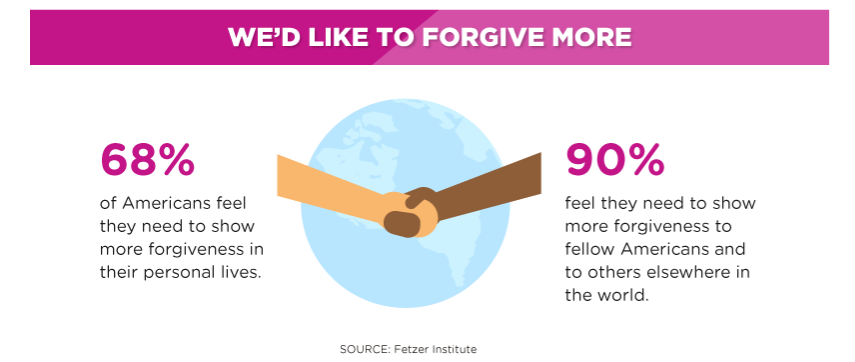Forgiveness is a complex topic. A large part of enabling the skill of forgiveness is choosing to live in peace by not needing things from others emotionally or in actuality as far as personal independence. Working towards not living in anger or frustration when we are having difficulty forgiving is a part of the process. How do we handle this dichotomy and the role of tension emotions play which hold us back from forgiveness? The skill of forgiveness may be more important to us socially than we realize. Findings from a study conducted by the Fetzer Institute reveal that most Americans feel the need to show more forgiveness in their personal lives and worldwide.

In my experience there is a fine line when trying to manage my capacity for forgiveness. I have also consequently held friends to low standards for the quality of our interactions. Even recently I had an acquaintance tell me I needed to get better friends. How do we decide when we just plain deserve better? Forgiveness can either be accompanied by the continuation of a situation or the end. As an adult friendships can be difficult to come by. Personally I’ve had a lot of difficulty dating as well, as an adult it just seems to ruin things. Consequently I tend to keep things in the “friend zone”, because forgiveness is very difficult territory in these situations for many people, me included. However, blocking out dating and relationships does not get me any closer to the fulfillment of having a family and being loved by a husband of my choosing as I envisioned since childhood. At times maintaining forgiveness can seem like a trade-off for respect or be confused with lowering expectations. As a single black woman I often feel held to insurmountable expectations from strangers all the way up to family and friends. How I should behave, what choices I should make, what I should allow or give time, attention, energy or money to shifts with an ever changing hierarchy. My existence feels relative, and dispensable. It’s difficult to forgive when the stakes seem high, because in many cases my forgiveness will probably not be reciprocated.
At some point the anger or the grudge or the action led by resentment or repressed feelings is all we have to cling to when things change. Realizing that the toxic attachment we create to emotions, people, and situations when we are unforgiving is only affecting our own reality is the first step. When battling these types of things with others we are more so battling our own self by recreating a significant negative interaction to continuously engage with emotionally and mentally. It’s almost like an addiction, and all you have to do is go to that memory in your mind to justify the emotional pattern once the situation is over.
We may need to come to terms with the idea that most people, places and things come and go throughout our lives. We must greet a new season in our life with trust curiosity and open arms and say goodbye to the past with the same vigor knowing that closing a chapter is not negative, but a natural progression of your lifes true purpose and journey. We may struggle with letting go because we can’t fix things or make them go back to the “good times” and yes that’s uncomfortable, but we have to forgive in a way that does not perpetuate agitation. We have to choose to truly move on from it and transition. That’s where the grey area is. Do we start to shut ourselves off emotionally from the world in order to not care? Do we take on all the responsibility and burden of constantly fixing or mitigating our own pain, suffering or anger?
In some schools of thought they teach you to observe your feelings more like a guest passing through your awareness. In this way we are not the hosts of emotions, but vessels where they pass through. Secondly, as humans we tend to attach meaning to all feelings thereby creating an emotion and subsequently attaching a story to it to rationalize it and so on. How dare we allow any mysterious vibration in our stomach or strange energy in our chest to dictate so pointedly our outward interactions or the sense we make of the world around us? Each way we turn it seems like running from being human is the thing we have to do and we may even feel guilt for living in a mindset that needs to constantly be corrected. The mental stamina it takes to constantly be correcting or fixing ourselves can be exhausting. Its difficult to go from a scarcity mindset to a mindset of abundance and maintain it. Life is happening constantly all around us regardless of how we wish or plan to react to it. Life’s situations have their own demands. We can either surrender to the unknown or keep fighting for an idealized life of our choosing.
Forgiving myself allows me to learn from past experiences and attempt to do better in the future. This applies to both personal and professional life. I think in sharing our forgiveness practices we tend to express them in broad sweeping statements or one or two particular instances. However, it’s really the complex grey area that we need to unpack and create tangible steps for if we want to consistently and methodically help ourselves and others to forgive as part of a health and well-being practice. Below are some things to consider in order to help fight through the grey area of forgiveness.
- ) Regret: Being conscious of the feeling of regret is very important, because it makes us feel wrong for making decisions or changing things from the way they once were. Often times regret comes during moments of nostalgia when you think of the best possible times a situation had to offer. Be careful not to fall into this trap. When I sense myself becoming nostalgic or see people try to engage me in conversations about the past that seem overly idealistic I turn to the lessons learned rather than try to wish back the experience. I counterbalance regretful moments that seem to thrive in uncertainty by reminding myself of the cause for needing to let go of that circumstance or life choice. Finally, another tool I use to combat regret is rooted in gratitude. Acknowledge the people and places that exist in the present and write down one reason you can be thankful for each of these present constants even if they also have flaws.
- ) Feeling wronged: Sometimes we are forced to be in proximity to people who have wronged us or want to manipulate us. In these circumstances, it’s easy to fall into the role of feeling victimized. When I start to notice feelings of defensiveness or victimization I try to realign my consciousness. There is no way to ignore the elephant in the room, but the elephant is not the entire room. In this way, you can allow yourself to not need tension to thrive even if the other person does. This will probably not stop the other person from trying to make you engage with their negativity, but it will allow you to have the power of choice to not engage and this is also a form of forgiveness. Not all forgiveness looks the same. This does not mean you can’t respectfully speak up for yourself, but always consider if it’s worth it or not to engage. In this way we forgive by “letting it go” even if you are justified in feeling wronged.
- ) Understanding: Try and understand the other side. Perhaps they are viewing the situation through a very different lens. Sometimes if we feel misunderstood we can start by understanding a situation from the view of other people in it. At times this can be difficult or even painful. It also requires “being the bigger person” which doesn’t come with any flashy bells or whistles attached and also may mean we have to sacrifice our own ego or rightness for someone else’s. This is a form of forgiveness because although there is no resolution there is a conscious choice to exercise compassion as a tool rather than negativity.
- ) Self-love: Remind yourself that you are malleable and can trust yourself to find good solutions for any situation. There is no perfection, you will not please everybody. You can still be whole and happy if others are displeased or upset. This is another form of forgiveness because you acknowledge that you are mentally and emotionally stable regardless of perceived imperfections.You forgive your human nature and surrender to self-acceptance which is probably the only potential constant you control. Confidence or the feeling of success does not need to be determined by the outside or collective approval of others. The same you is present in perceived success or failure.
Visit us at https://atlibertylife.com/
Originally published at medium.com


